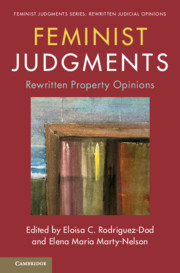Book contents
- Feminist Judgments: Rewritten Property Opinions
- Feminist Judgments Series
- Advisory Panel for Feminist Judgments Series
- Feminist Judgments: Rewritten Property Opinions
- Copyright page
- Dedication
- Contents
- Advisory Panel for Feminist Judgments: Rewritten Property Opinions
- Notes on Contributors
- Preface
- Acknowledgments
- About the Cover Art
- Part I Introduction
- Part II Allocation of Rights
- Part III Patents, Publicity Rights, and Trademarks
- Part IV Condemnation and Adverse Possession
- Part V Gifts and Future Interests
- Part VI Tenancy in Common, Joint Tenancy, and Tenancy by the Entirety
- 12 Commentary on Sawada v. Endo
- 13 Commentary on Taylor v. Canterbury
- 14 Commentary on Coggan v. Coggan
- Part VII Exclusionary Zoning
- Part VIII Evictions
- Part IX Landlord–Tenant Premises Liability
- Index
12 - Commentary on Sawada v. Endo
from Part VI - Tenancy in Common, Joint Tenancy, and Tenancy by the Entirety
Published online by Cambridge University Press: 21 October 2021
- Feminist Judgments: Rewritten Property Opinions
- Feminist Judgments Series
- Advisory Panel for Feminist Judgments Series
- Feminist Judgments: Rewritten Property Opinions
- Copyright page
- Dedication
- Contents
- Advisory Panel for Feminist Judgments: Rewritten Property Opinions
- Notes on Contributors
- Preface
- Acknowledgments
- About the Cover Art
- Part I Introduction
- Part II Allocation of Rights
- Part III Patents, Publicity Rights, and Trademarks
- Part IV Condemnation and Adverse Possession
- Part V Gifts and Future Interests
- Part VI Tenancy in Common, Joint Tenancy, and Tenancy by the Entirety
- 12 Commentary on Sawada v. Endo
- 13 Commentary on Taylor v. Canterbury
- 14 Commentary on Coggan v. Coggan
- Part VII Exclusionary Zoning
- Part VIII Evictions
- Part IX Landlord–Tenant Premises Liability
- Index
Summary
Sawada v. Endo1 has become a foundational case for feminist jurisprudence despite facts that, at first blush, appear to have nothing to do with matters of women’s equality. An automobile-on-pedestrian personal injury case in Hawaii, the dispute veered into the terrain of gender and marital property law only when the tortfeasor and his wife sought to shield their sole asset – the family home co-owned in tenancy by the entirety – from the claims of the tort victims, conveying it to their sons prior to judgment. That purported transfer provides the occasion for considering the modern contours of the estate owned by the couple. This dispute over whether the conveyance was made to defraud the tort victim creditors still does not directly implicate the interests of the actual woman who co-owned the estate in question. She had no role in the accident and then died prior to the resolution of the case. The specific issue as presented on appeal is entirely about the nature of the husband’s interest.
- Type
- Chapter
- Information
- Feminist Judgments: Rewritten Property Opinions , pp. 253 - 282Publisher: Cambridge University PressPrint publication year: 2021

